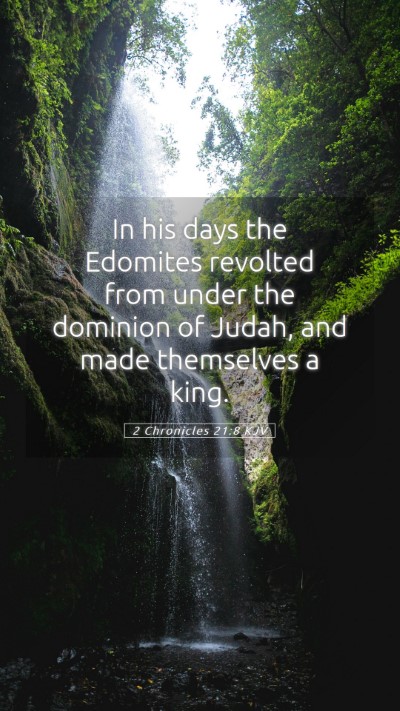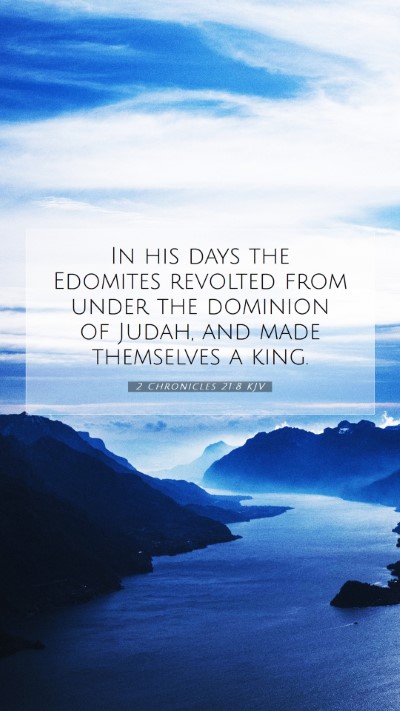Bible Verse Meaning of 2 Chronicles 21:8
Verse Reference: 2 Chronicles 21:8 - "In his days the Edomites revolted from under the dominion of Judah, and made themselves a king."
Summary of Meaning
This passage highlights a significant turning point during the reign of Jehoram, King of Judah. It depicts a period of rebellion from Edom, a neighboring nation, against Judah’s control. This revolt signifies not only a political challenge but also reflects the spiritual disarray and downfall that often accompanied the reigns of kings who strayed from God's commandments.
Contextual Background
Jehoram, who ascended the throne after his father's death, had begun his reign in a period marked by familial discord and idolatry. The revolt of the Edomites, underlined by their choice of an independent king, underscores the weakening influence of Judah during Jehoram’s rulership. Historical context suggests that this rebellion was not merely a political maneuver but was also influenced by the spiritual decline in Judah, which resulted from Jehoram's departure from Yahweh's ways.
Commentary Insights
Matthew Henry’s Commentary: Henry notes that the rebellion of Edom illustrates the consequence of Jehoram's evil practices, particularly the introduction of idolatry among the people of Judah. He highlights that such actions inevitably lead to unrest and discord within one's realm. Henry emphasizes that the decline into idolatry not only invites external rebellion but also alienates the kingdom from the divine favor of God.
Albert Barnes’ Commentary: Barnes stresses the significance of the Edomite revolt as a dire reflection on Jehoram’s leadership. He points out that the loss of subjugation over Edom was not just a military defeat but a sign of God’s judgment on a king who had turned away from obedience to the divine commands. Barnes also stresses the implications of losing control over Edom, which was crucial for the economic and strategic interests of Judah.
Adam Clarke’s Commentary: Clarke elaborates on the rebellion of Edom as illustrative of the broader themes of consequence and judgment in the biblical narrative. He asserts that the political turmoil that arises is directly correlated to spiritual faithfulness. Clarke reminds readers that true leadership must align with God’s directives, or else it faces inevitable decline and rebellion both from within and outside.
Theological Significance
This verse serves as a poignant reminder of the importance of adhering to God's instructions. It illustrates the consequences of turning away from righteousness, showcasing how straying from divine principles leads to disorder and rebellion. The rebellion against Judean authority not only reflects on Jehoram but serves as a cautionary tale for all leaders and nations—their spiritual and moral standings directly influence their stability and success.
Applications to Daily Life
- Understanding Authority: Recognizing that authority is granted by God, and leaders must operate within His moral framework to maintain order.
- Spiritual Vigilance: A reminder to remain vigilant in one's faith, ensuring that personal and communal practices align with biblical teachings to prevent discord.
- Role of Leadership: Encourages individuals in leadership roles to seek God’s guidance continually, recognizing the weight of influence on those they lead.
Cross References
- 2 Kings 8:20-22 - Discusses the revolt of Edom in more detail.
- 2 Chronicles 21:4 - Highlights Jehoram’s rise and actions against his brothers.
- Hebrews 12:15 - Illustrates the need to maintain a strong spiritual heritage to avoid rebellion and bitterness.
Conclusion
2 Chronicles 21:8 serves as both a historical account and a theological lesson. The narratives of kings and nations in Scripture provide profound insights into the relationship between human actions and divine governance. By studying this passage, believers gain valuable Bible study insights and understanding Scripture in a way that emphasizes the importance of fidelity to God.


